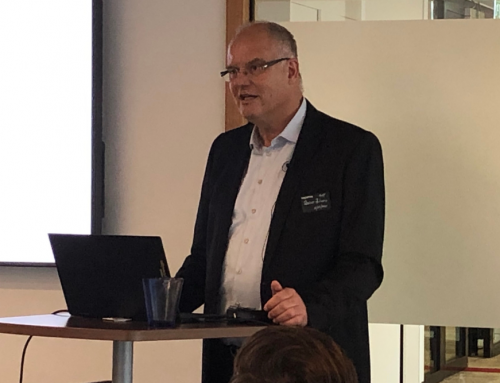Finance professionals are up against it. They need to deliver better a quality service at lower cost. It is a pressure that never seems to go away. But we’re in a good place because new technology is there to support change. Everything from simple automation to machine learning and AI are now available to finance as business becomes more “intelligent”.
Jørgen Bo Johansen is a veteran of SAP and knows his finance. Following an extended position as CFO for Nordic & Baltic States, France, UKI, Netherlands, and BeneLux, he is now director of sales. Here he shares some insights into the challenges, trends and solutions in finance – edited from an interview he conducted with the industry website the Digitalist.
“Change to the finance department has come in different waves: [the most recent was the] creation of the new intelligent ERP available in the cloud. Suddenly it was possible to have one universal version of the truth. It gave financial departments real-time data and reporting capacity and empowered them to drill down to the most detailed level of information. Taken together, these advances equaled a complete change for financial portfolios.
Having one universal truth from one set of data is massively significant. And having this available in real-time is extraordinarily powerful because it supports faster decision-making on a much more detailed level. That allows companies to be faster and more agile; necessary conditions for today’s new economy.
The world is becoming increasingly agile. The new technology being continuously introduced to the market today is evidence of this constant forward progress. Markets are being disrupted; over the last 50 years, the average lifespan of a company has gone from 75 years to 15 years, and 50% of the companies that existed 20 years ago are now gone.
This new landscape requires more flexible finance. But agility and disruption are not the only issues; new legislation is constantly being introduced within the scope of technology. Other forces include significantly more volatile markets in terms of currency, mergers and acquisitions, and so forth. All this puts huge pressure on the CFO and finance department to engage in business development.
The CFO role has become more strategic than it used to be. You know, 20 years ago, the CFO was what they call a bean-counter, doing the numbers, making sure that the company met requirements, creating annual accounts, filing tax declarations, and so forth.
But today the role is more similar to a business partner. Along with CEOs, CFOs now take part in strategy and in mergers and acquisitions and play an important role in looking into new business models.
Ultimately, the goal is to be a disruptor instead of being disrupted.
The systems used by many companies today have many inconsistencies. They hold a diversity of data from different systems compiled in the general ledger, which might range from management accounting to statutory accounting. Reconciling all of that takes a lot of work and a huge amount of time for things that could be automated, and that inefficiency is why one source of truth is so important.
I think we are moving into an era where companies are looking for digitalization, automation, standardized processes, robotic postings, and machine learning. There are so many new and potential applications for machine learning that will remove the need for manual work that doesn’t add value.
How can the predictive capacities of machine learning and artificial intelligence be used in finance?
You cannot have an intelligent enterprise without an intelligent finance department. There is a huge need for more automation across all aspects of business. Using machine learning for compliance and fraud detection would be an example, but there are many others. A normal system reconciles the payments that come in with the invoices that have been sent out. Yet there could be a number of reasons why the customer has paid a different amount, so these amounts don’t reconcile: maybe they have a certain volume discount or maybe they’re using a different currency. Machine learning can evaluate and take these aspects into account. It offers a whole new level of complexity by looking at the payment pattern from the past month within the context of the last two years to identify certain patterns.
Having the right processes and technology has become a competitive advantage, and it’s really necessary to stay in the game. Igniting the finance department and data sourcing is crucial. I think data will be the new gold. If you don’t have the right data at the right moment, you won’t be able to make the right decisions.
I think technology will move extremely quickly toward machines taking over normal manual transactions in the next couple of years. And simultaneously, I think we will also see more rigorous regulation established as concern increases about the regulatory side of technology. We will see more legislation around using technology, and it will be, in part, up to the CFO to keep pace. We’re seeing new accounting standards emerge, and I think this trend is set to continue. Then, with all of the data flowing and all the new things you can do with technology, I think compliance, cybersecurity, and things like that will also come up this year for us again.”
Many thanks to the Digitalist for this insightful interview with Jørgen Bo Johansen of SAP You can read the full interviews here and here
If you think your company is not big enough for the kind of technology benefits Jorgen has outlined we have good news. InCloud Solutions has just launched a fast, fixed price solution called InCloud Express Financials with you in mind. This financials only solution brings you all the benefits of automation for a fraction of the cost of big enterprise level ERP. It is based on the excellent Business ByDesign solution for mid sized business from SAP
Follow the links to find out more and please let us guide you with more information by dropping an e-mail to us here; [email protected]










Leave A Comment